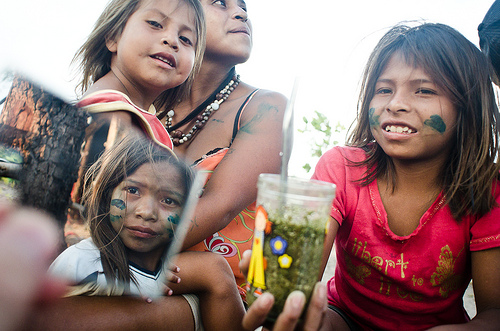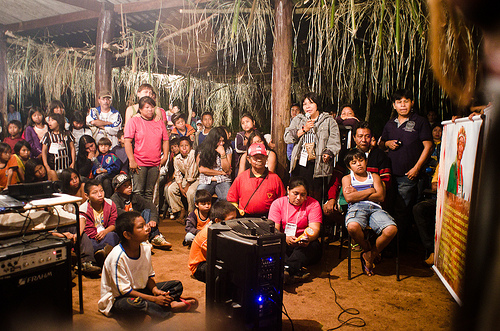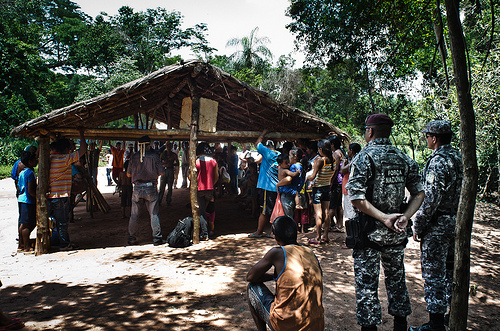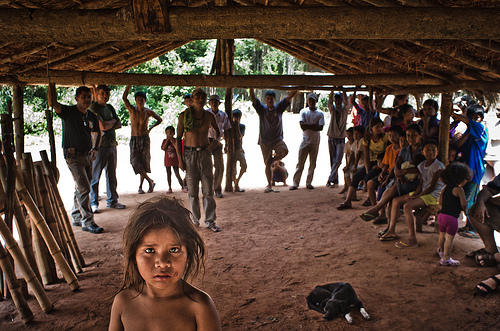This post is part of our special coverage Indigenous Rights.
A letter released at the beginning of October 2012 by the indigenous community Guarani-Kaiowá Kue / Mbarakay, in the state of Mato Grosso do Sul (MS), led to an enormous mobilization in Brazil and overseas. On the internet, many citizens followed the struggle waged by this community in the municipality of Iguatemi, under threat of eviction from their lands, and people signed various online petitions.
This mobilization was such a success that the Federal Regional Court of the 3rd region, in São Paulo, suspended the operation to expel the Guaraní-Kaiowá from their encampment, answering the request of the National Indian Foundation (FUNAI).
Maria do Rosário, National Secretary of Human Rights in the Presidency of the Republic, announced on October 30 on Twitter [pt]:
@_mariadorosario: Acabamos de receber decisão judicial que suspende reintegração de posse do território dos Guarani-Kaiowá. Recurso do Gov.Federal foi acatado!
@_mariadorosario: We have just received the judicial decision that suspends the eviction of the Guaraní-Kaiowá. The appeal of the Federal Gov. has complied!

Guarani Kaiowa children. Expedition to Pyelito Kue village, Mato Grosso do Sul, November 2012. Photo by Percurso da Cultura on Flickr (CC BY-SA 2.0).
The 50 men, 50 women and 70 children of the tribe Guaraní-Kaiowá will be able to stay on the Cambará Ranch in Iguatemi-MS, where they have been confined to an area of 2 hectares (equivalent to two football fields). The decision should stand until the identification and demarcation of the final indigenous territory by FUNAI.
The solution is precarious, as relations with the owner continue to be tense and dangerous. On Wednesday October 24, an indigenous woman from Pyelito Keu was sexually assaulted [pt] by eight men on a ranch, according to allegations by indigenous people. The Ministry of Justice send a new contingent of national forces to maintain order in the region.
For Attorney General Marco Antonio Delfino de Almeida [pt] the mobilization on social networks was a success:
a mobilização das redes sociais foi definitiva para alcançar esse resultado. Provocou uma reação raramente vista por parte do governo quando se trata de direitos indígenas.
The mobilization by social networks was definitive to achieve this result. It provoked a reaction rarely seen by the Government on indigenous rights.

Meeting of Guaraní-Kaiowá teachers and leaders, November 2012. Photo by percursodacultura on Flickr (CC BY-SA 2.0)
Guarani-Kaiowá leaders, denouncing the genocide perpetrated on the ethnic group, commemorated the announcements, but concluded that only the demarcation of land will cease the conflict between Indians and rural producers of the region. They sought to increase the solidarity network for the Guaraní-Kaiowá. The struggle is not only against eviction, but for the definitive demarcation of indigenous lands.
Ladio Veron, Guaraní-Kaiowá leader, explains the difficulties to site Carta Maior, in an interview [pt] published on October 28:
In the state of Mato Grosso do Sol, 43,000 Guaraní-Kaiowá demand the return of their original lands that they call “tekoha”. They want to leave the reservation and put up encampments, that are mostly legal. There are more than 30 Guaraní-Kaiowá encampments confined to roadsides or within ranches in areas that Indians have occupied. Add this to more than 20 areas that were taken back and regularized after strong pressure by the indigenous who lost a number of community leaders in the struggle. However, all of these areas are very limited.
A technical note [pt, pdf] published by FUNAI in March 2012 concluded that the territory reclaimed by the indigenous in Pyelito Kue and Mbarakay has been occupied since ancestral times by the ethnic groups Guaraní and Kaiowá. Since 1915, when the first Indigenous Land was instituted, and principally from the 70s and 80s, the expulsion of indians in favor of land owners of agricultural lands has increased (principally to increase sugar cane and soy production), in addition to the confinement and regrouping of different ethnic groups, resulting in insecurity and social and cultural uprooting.
The site of the International Committee of Solidarity with the Guaraní and Kaiowá refers [pt] to the economic weight of sugarcane production in this region:
“A cana que hoje está sendo plantada lá e colhida como etanol já é misturada com sangue indígena Guarani Kaiowá”, disse o cacique. O peso do agronegócio na região teve uma guinada após acordo do ex-presidente brasileiro Lula com ex-presidente dos Estados Unidos George Bush sobre a produção de biocombustíveis.
“The sugarcane that today is being planted there and harvested as ethanol is already mixed with the blood of the indigenous Guaraní-Kaiowá,” said the chief. The weight of agrobusiness in the region took a turn after the agreement of ex-President Lula with the ex-President of the US George Bush on biofuels production.
An article by Larissa Ramina, International Law professor at the Federal University of Paraná and at UniBrasil, explained the forewarned tragedy on the site Carta Maior [pt]:
A situação dos Guarani-Kaiowá, segundo grupo mais numeroso do país, é considerada a mais grave. Confinados em reservas como a de Dourados, encontram-se em situação de catástrofe humanitária: além da desnutrição infantil e do alcoolismo, os índices de homicídio são maiores que em zonas em guerra, como o Iraque.
The situation of the Guaraní-Kaiowá, the second largest group of the country, is considered to be the most grave. Confined in reservations like those at Dourados, they find themselves in a situation of humanitarian catastrophe: beyond child malnourishment and alcoholism, homicide rates are greater than those in a war zone, like Iraq.
A diplomatic cable from 2009, leaked by Wikileaks, shows the disdain by authorities in Mato Grosso do Sul before the demands of the Guaraní-Kaiowá for the land planted by producers for decades.
The Federal Public Ministry [pt], institution intended to represent the interests of citizens and communities in criminal cases (the “fourth” branch of power in Brazil) said:
Afastar a discussão da ocupação tradicional da área em litígio equivale a perpetuar flagrante injustiça cometida contra os indígenas em três fases distintas e sucessivas no tempo. Uma quando se lhes usurpam as terras; outra quando o Estado não providencia, ou demora fazê-lo, ou faz de forma deficiente a revisão dos limites de sua área e quando o Estado-Juiz lhes impede de invocar e demonstrar seu direito ancestral sobre as terras, valendo-se justamente da inércia do próprio Estado.
Moving the discussion away from the traditional occupation of the area in litigation is tantamount to perpetuating the flagrant injustices committed against the indigenous in three distinct and successive phases over time. One when their lands are usurped; another when the State does not provide, or delays in providing, or carries out flawed reviews of the borders of their area and when the State-Judge prevents them from invoking or demonstrating their ancestral rights over the lands, taking advantage as such of the State's own inertia.
State deputy Pedro Kemp, leader of the Worker's Party (PT), affirmed [pt] in the Mato Grosso do Sul Legislative Assembly on October 31 that:
Desenvolvimento não é só produção de boi, milho e soja, mas também respeito ao povo, direito a cidadania. O desenvolvimento deve ser econômico e social, com diretos a todos.
Development is not just the production of cattle, corn and soy, but also respect for the people, rights and citizenship. Development should be economic and social, with rights for all.
The indians sent thanks through a Facebook group [fr] created in solidarity in French:
Nós, Guarani Kaiowá e os sobreviventes que realmente querem sobreviver, desejamos com esta mensagem simples expressar publicamente nossa imensa gratidão a todas e todos que acrescentaram Guarani-Kaiowá a seus nomes. Como todos sabem, os Guarani e Kaiowá, sozinhos, podem ser exterminados, mas estamos confiantes de que, com a real solidariedade humana e o apoio de todos vocês, podemos ser salvos de várias formas de violência contra nossas vidas e, especialmente, evitar a extinção do nosso povo. Graças a esse seu gesto de amor pela nossa vida, sentimos um pouco de paz e esperança em uma verdadeira justiça. Entendemos que há cidadãs e cidadãos movidos por um genuíno amor ao próximo, que têm sede de justiça e exigem esta justiça. Não temos palavras para agradecer a todos. Só dizemos JAVY'A PORÃ, a paz esteja em seus corações. Muito obrigados.
We, Guaraní-Kaiowá and the survivors that really want to survive, wish with this simple message to publicly express our immense gratitude to all those who added Guaraní-Kaiowá to their names [on Facebook]. As you know, the Guaraní and the Kaiowá, alone, can be exterminated, but we are confident that, with the real human solidarity and support of you all, we can be saved from various kinds of violence against our lives and, especially, avoid the extinction of our people. Thanks to this gesture of love for our lives, we feel a little more peace and hope for real justice. We understand that there are citizens moved by genuine love for their neighbor, that thirst for justice and demand this justice. We do not have words to thank all. We will just say JAVY'A PORÃ, peace be in your hearts. Thank you very much.
This post is part of our special coverage Indigenous Rights.









4 comments
JUSTICE for the people